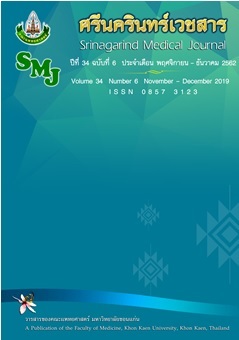Renal Dialysis Refusal in End-Stage Renal Disease Patients Under Universal Health Coverage Scheme in Uttaradit Province
Keywords:
Refusal; Dialysis; End-Stage Renal DiseaseAbstract
Background and Objective: Almost half of end-state renal disease patients under universal health coverage scheme in Uttaradit province rejected dialysis despite receiving counseling from the multidisciplinary team from 2015 to 2017, which has been a barrier to treatment. This study aimed to understand patients’ decision making regarding dialysis rejection.
Methods: A qualitative study was then conducted based on semi-structure in-depth interviews with explanatory model and non-participatory observation with 36 ESRD (End-Stage Renal Disease) patients under universal coverage scheme who rejected dialysis in Kidney Disease Center at Uttaradit hospital during January to March 2018. These data were examined using content analysis.
Results: Most patients could not describe chronic kidney disease and dialysis based on biomedical knowledge. However, patients had a model of thinking, definition and the decision to reject dialysis based on their beliefs, experience and individual context. There were five explanatory models, which were; dialysis indicated impending death, dialysis made independent life impossible, dialysis reduced the ability to care for their family, dialysis was a shackle, and dialysis decreased the remaining quality of life.
Conclusion: Patients’ view, dialysis is not just a treatment but it is liked to living and context with constraints. So the multidisciplinary team should understand, respect the decision of the patients and treat patients holistically.
References
2. Kwok WH, Yong SP, Kwok OL. Outcomes in elderly patients with end-stage renal disease: Comparison of renal replacement therapy and conservative management. Hong Kong Journal of Nephrology 2016;19:42-56.
3. Shih CJ, Chen YT, Ou SM, Yang WC, Kuo SC, Tarng DC. The impact of dialysis therapy on older patients with advanced chronic kidney disease: a nationwide population-based study. BMC Med 2014; 12: 169.
4. Moist LM, Al-Jaishi AA. Preparation of the Dialysis Access in Stages 4 and 5 CKD. Adv Chronic Kidney Dis 2016; 23: 270-5.
5. Fung E, Slesnick N, Kurella Tamura M, Schiller B. A survey of views and practice patterns of dialysis medical directors toward end-of-life decision making for patients with end-stage renal disease. Pallat Med. 2016; 30: 653-60.
6. Stroupe KT, Fischer MJ, Kaufman JS, O'Hare AM, Sohn MW, Browning MM, et al. Predialysis nephrology care and costs in elderly patients initiating dialysis. Med Care 2011; 49: 248-56.
7. Park JI, Kim M, Kim H, An JN, Lee J, Yang SH, et al. Not early referral but planned dialysis improves quality of life and depression in newly diagnosed end stage renal disease patients: a prospective cohort study in Korea. PloS One 2015; 10: e0117582.
8. Limrangsan S, Suwannaprom P. Explanatory model of hypertension and antihypertensives use among patients at Hangdong hospital, Chiang Mai Province. Thai Pharm Health Sci J. 2014;8:66-77.
9. Direksri S, Chanthapasa K. Explanatory model of chronic kidney disease in perspective of patient. The 4th Annual Northeast Pharmacy Research Conference of 2012 “Pharmacy Profession in Harmony”Faculty of Pharmaceutical Sciences, Khon Kaen University, Thailand . IJPS 2013; 1: 72-6.
10. Ladin K, Lin N, Hahn E, Zhang G, Koch-Weser S, Weiner DE. Engagement in decision-making and patient satisfaction: a qualitative study of older patients' perceptions of dialysis initiation and modality decisions. Nephro Dial Transplant; 2016.
11. Walker RC, Howard K, Morton RL, Palmer SC, Marshall MR, Tong A. Patient and caregiver values, beliefs and experiences when considering home dialysis as a treatment option: a semi-structured interview study. Nephrol Dial Trasplant 2016; 31: 133-41.
12. Dahlerus C, Quinn M, Messersmith E, Lachance L, Subramanian L, Perry E, et al. Patient Perspectives on the Choice of Dialysis Modality: Results From the Empowering Patients on Choices for Renal Replacement Therapy (EPOCH-RRT) Study. Am J Kidney Dis 2016; 68: 901-10.
13. Chanouzas D, Ng KP, Fallouh B, Baharani J. What influences patient choice of treatment modality at the pre-dialysis stage? Nephrol Dial Transplant 2012; 27: 1542-7.
14. Johnston S, Noble H. Factors influencing patients with stage 5 chronic kidney disease to opt for conservative management: a practitioner research study. J Clin Nurs 2012; 21: 1215-22.
15. Chandna SM, Da Silva-Gane M, Marshall C, Warwicker P, Greenwood RN, Farrington K. Survival of elderly patients with stage 5 CKD: comparison of conservative management and renal replacement therapy. Nephrol Dial Transplant 2011; 26: 1608-14.




